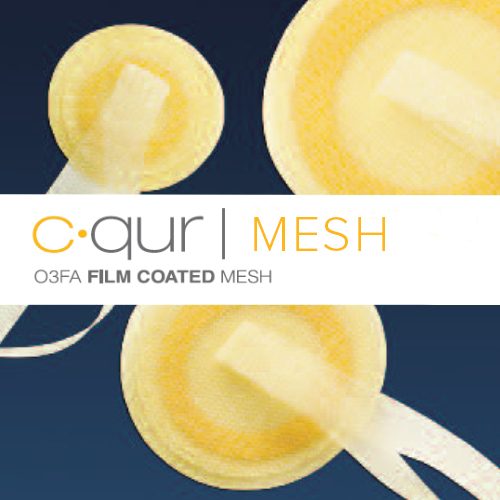Atrium C-Qur Mesh
Home »
Atrium C-QUR Mesh Lawsuits
Atrium, owned by Maquet Cardiovascular has recalled the Atrium C-Qur Mesh hernia patch back in 2013. Even though there was a recall, none of Atrium’s hernia mesh products were actually pulled from the market. Atrium simply wrote a letter notifying doctors to be aware that the mesh’s coating could stick to the packaging and peel off the mesh itself. The purpose of the the coating is to prevent the polypropylene portion of the mesh from coming into direct contact with a patient’s organs. Unfortunately, physicians have reported to the FDA experiences of the coating peeling off upon implantation or within days after implantation.

Atrium C-Qur Hernia Mesh Problems
Atrium first introduced C-Qur Mesh (pronounced Atrium “Secure”) in 2005, through the controversial 510(k) FDA approval system, which allowed the medical device to be introduced without rigorous pre-market research and studies.
Despite signs of potential problems with the Atrium C-Qur mesh design, the manufacturer has introduced a variety of similar products for use in hernia repair, chest wall reconstruction and treatment of traumatic or surgical wounds, including:
- Atrium C-Qur Mesh
- Atrium C-Qur Mosaic
- Atrium C-Qur TacShield
- Atrium C-Qur V-Patch
- Atrium C-Qur Centrifx
- Atrium C-Qur FX Mesh (formerly C-Qur Lite)
All of these products are constructed out of an Atrium polypropylene mesh, with an outer coating of gel made from omega 3 fatty acids, called the O3FA layer.
Risks and Symptoms
Those who have been implanted with Arium’s C-Qur mesh may suffer from various complications, including:
- Infections
- Allergic Reactions
- Abdominal Pain, Bowel Adhesions, Ulcers or Organ Perforation
- Mesh Erosion or Failure
- Revision Surgery
Several studies have investigated the complications associated with Atrium’s C-Qur hernia mesh. A study conducted in Belgium had to be stopped early because of an unacceptably high rate of C-Qur hernia mesh infections. A separate study also experienced infections in nearly every C-Qur hernia mesh that was implanted.
Recently, the FDA sued Atrium and Maquet for introducing adulterated medical devices into interstate commerce. The FDA was granted a permanent injunction against the facility that manufacturers the C-Qur hernia mesh. Atrium’s hernia mesh was not pulled off the market though. Many providers have discontinued using the C-Qur hernia mesh; however, it is still being implanted at some hospitals.
If you, a friend or family member has suffered infections, gastric ulcers or other hernia mesh complications, request a free consultation and claim evaluation. Each case does have a statute of limitations, or deadline by which any Atrium C-Qur lawsuit must be filed, so it is important to review any potential claims as early as possible to make sure that your legal rights are protected. Contact The Olinde Firm now, for your free case evaluation.
FREE CASE REVIEW
If you believe that you or someone you know may have had Atrium C-Qur Mesh implanted®, please contact us now for a free, confidential consultation.
New Orleans
Of Counsel at Huber, Thomas & Marcelle
1100 Poydras Street, Suite 2200
New Orleans, LA 70163
Phone: (504) 587-1440
Toll Free:1-800-587-1889
North Shore
Mailing Address
P.O. Box 55
Mandeville, LA 70470
Phone: (504) 587-1440
Toll Free: 1-800-587-1889
New Orleans East
New Orleans East Office
8816 Chef Menteur Highway
Suite B
New Orleans, LA 70127
Phone: (504) 587-1440
Toll Free: 1-800-587-1889
Free Case Evaluation
Copyright © 2025 The Olinde Firm - New Orleans Attorneys. All rights reserved. Disclaimer The information contained in this website may be considered advertising under the Rules of the Supreme Judicial Court of Louisiana and is for general information purposes only. Nothing contained within this or associated pages, documents, emails, or other communications should be taken as legal advice for any individual case or situation. The information on this website is not intended to create, and communications exchanged in connection with this website are not intended to create or constitute an attorney-client relationship. Although all communications are considered confidential, we do not accept representation of clients until such time as we enter into a written agreement for such representation.
